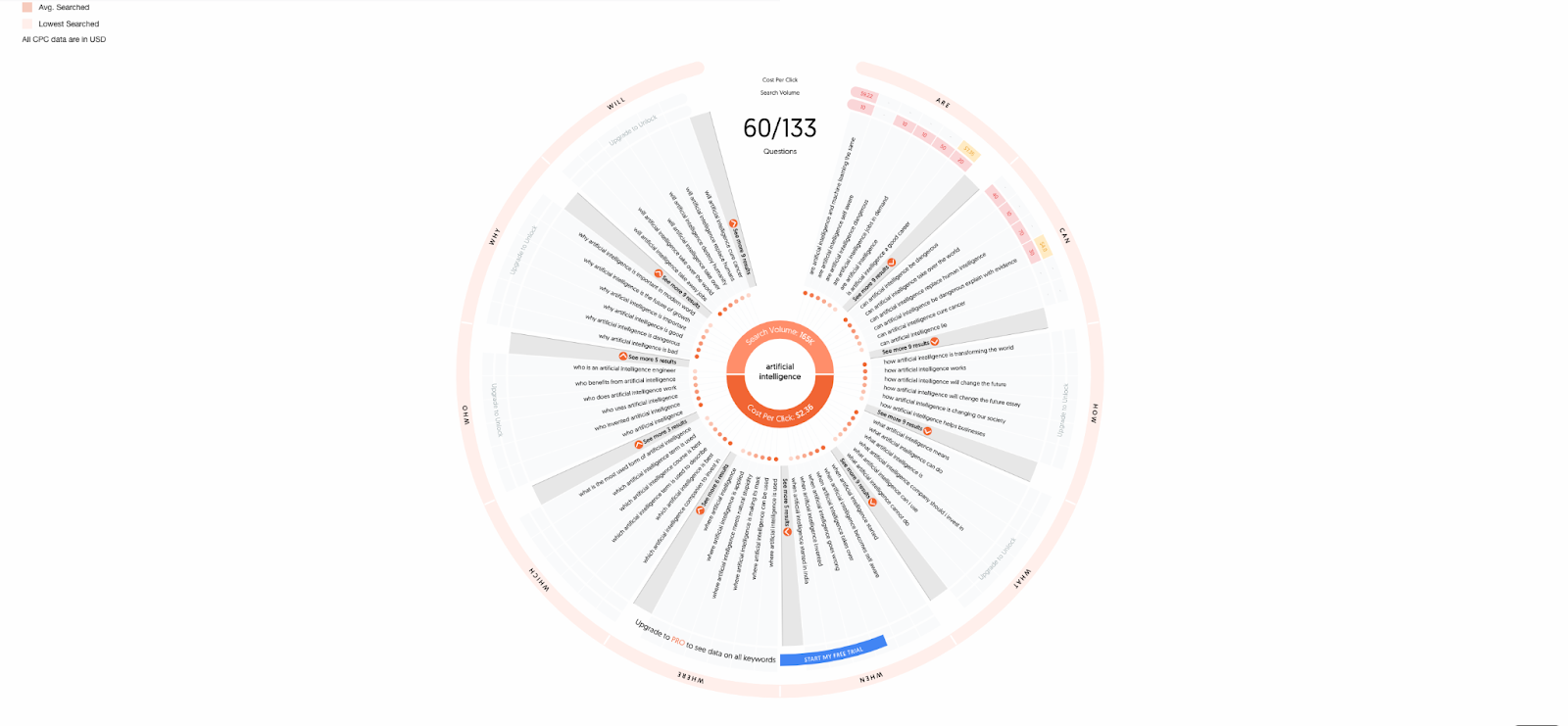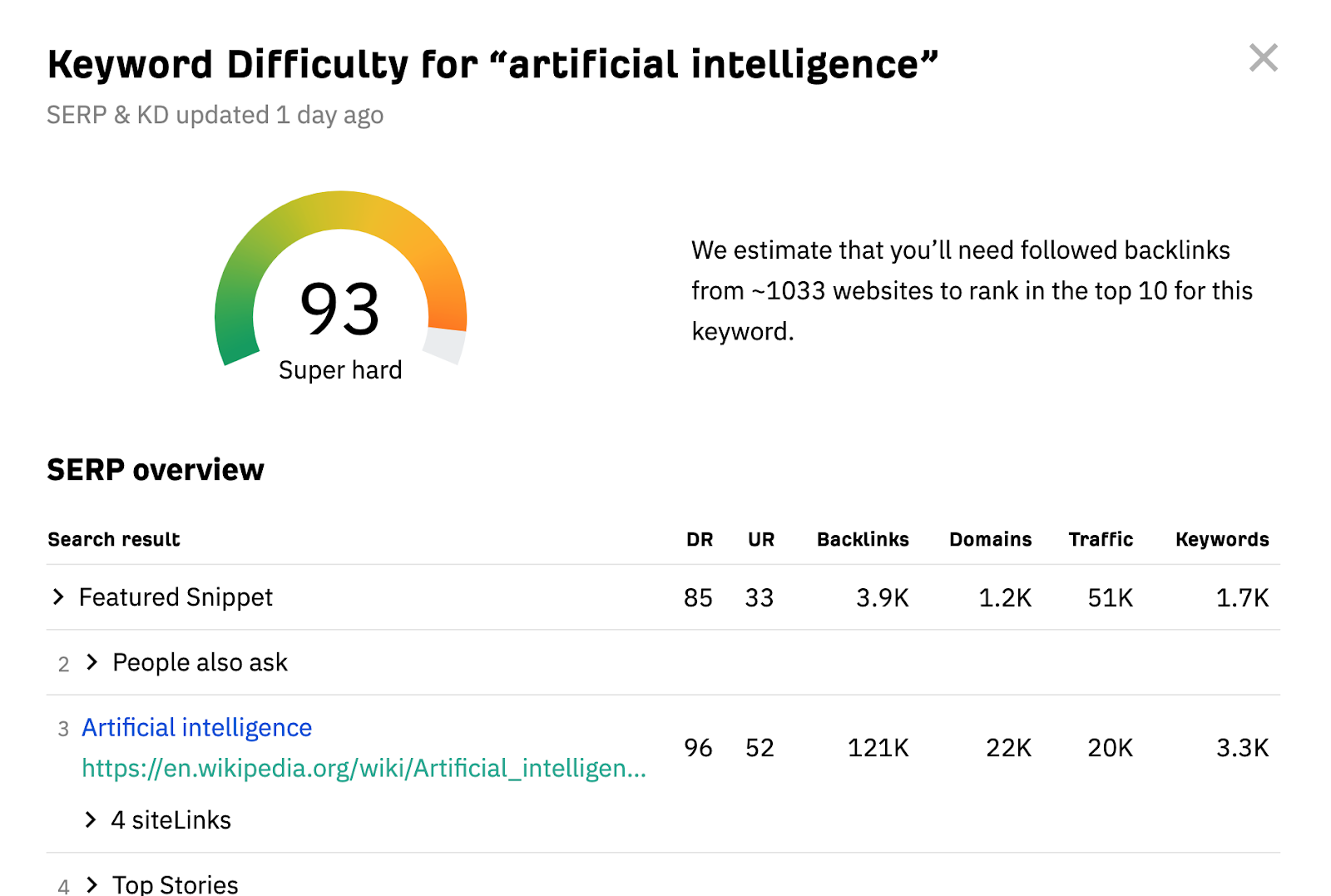What do you do when you need an answer quickly? Chances are, you open a browser on your desktop or phone, type in your query, and click on a page that looks like it might have the answer you’re looking for. The words you type into the search bar, whether searching for ‘best plumbers near me’ or ‘best local family law firms,’ determine how easily you find what you’re looking for. Those keywords are exactly how customers find your website as well.
If you want more people to find your business, you need to not only understand what phrases and keywords your customers are using, but also how to use them. That’s where artificial intelligence comes in. Artificial intelligence can help you optimize your keywords and drive more traffic and business to your site.
Keyword research is one of the most important skills for any SEO campaign. Knowing what keywords your audience is searching for allows you to create more valuable content and ultimately rank higher on search results pages, leading to increased conversions and sales.
Why Keyword Research
Keyword research is essential to improving your SEO, but the process can be time-consuming because it consists of finding and analyzing keywords and determining which to focus on.
This valuable research can highlight popular terms, uncover keywords you should be using, show you keyword popularity and ranking, and more. Keyword research helps you find which keywords are best to target and provides valuable insight into what queries your customer is searching for.
When conducting keyword research, there are three main elements we want to focus on to improve search engine ranking: relevance, authority, and volume. Let’s dive a little deeper into each of these components.
- Relevance: Google works by ranking content in terms of relevance. That’s why when you search ‘Mexican restaurants near me,’ you don’t see nearby shoe store sites. It will rank your content if it meets a searcher’s needs. Additionally, Google will rank the best resource for the query, making content creation a crucial strategy.
- Authority: Google gives more weight to sources it deems authoritative. What does that mean for you? It means you must make your site as helpful as possible. Fill your site with informative content and backlinks to give your business a competitive advantage.
- Volume: You might rank in the first spot on the first page for a certain keyword, but if no one searches for that term, it will be lonely on page one. Volume is measured by Monthly Search Volume (MSV), which means the number of times a particular keyword is searched, so you need to make sure the keywords you rank for are popular search terms.
How To Do Keyword Research
Knowing what keywords to utilize is critical to improving your SEO results, but how do you know which ones to target? To start, list 5-10 important, relevant topics you know about your business. Once you have a list of viable keywords, it’s time to dive in and research to verify which ones your customers use the most. Use a free keyword research tool to help identify keyword difficulty, search volume, and other relevant data to help develop your keyword strategy.
Keyword Difficulty and Search Volume
The keyword volume will tell you how popular and competitive a keyword is. Use that information to help you target the right keywords to drive traffic and increase conversions. Keyword difficulty measures how hard it is to rank for a particular keyword. A lower keyword difficulty score indicates ranking for that keyword is easier. Search volume shows the number of times a given keyword is searched during a certain period. Higher search volumes indicate more potential traffic for your site.
To maximize traffic to your site, look for keywords with low keyword difficulty and high search volume. A high search word volume could leave you competing with larger websites, whereas a low search volume could signal that customers may not find your content.

For our example, we searched the term “artificial intelligence.” The monthly search volume for our targeted term is 165,000, meaning, on average, 165,000 people search this term each month.
Next, it’s time to determine the keyword difficulty of your search term. For our example, “artificial intelligence” is a difficult keyword because it’s highly competitive.

Create Content
Knowing which keywords to target is important, but you can’t just add relevant keywords to your website and hope for boosted results on a search engine results page. You must provide useful, high-quality, relevant content that includes those keywords for your audience. Write blogs, articles, white pages, and website copy that include your keyword for higher rankings.
Think like a customer. Ask yourself what a person might hope to find when they type your query into a search engine. Then, create content that answers that question. Many free keyword research tools will also generate sub-topics related to your keyword query. For our artificial intelligence query, here are some possible content ideas:
- Are artificial intelligence and machine learning the same?
- Can artificial intelligence be dangerous?
- How does artificial intelligence work?
Long Tail Keywords vs. Short Tail Keywords
Long-tail and short-tail keywords both have a place in your SEO arsenal, but what’s the difference? Short-tail keywords are general, broad search terms that generally have high competition and high search volume. “Tacos,” “shoes,” or “cars” are examples of short-tail keywords. Long-tail keywords are niche, targeted terms that generally yield lower search volume and, in turn, lower competition. Following our example from above, “chicken tacos near me,” “striped sneakers for women,” or “best family car” are examples of long-tail keywords.
Determining which one is better is a tricky balance. Long-tail keywords have lower search volume and are generally seen as less popular keywords. But because they’re highly specific, they generally are more relevant and intent-driven. Someone searching “striped shoes for women” is likely searching for striped shoes because they’re ready to buy. Same for your business. People searching long-tail keywords are ready to purchase or need a specific service. However, short-tail keywords are important because they help you reach a wider audience, which increases your traffic and drives brand awareness. But because they’re a more general term, they’re more competitive, meaning it may be harder for you to rank using a short-tail keyword.
To effectively gauge the success of your keyword strategy, make sure to track your performance with various tools and metrics. Pay attention to impressions, clicks, click-through rates, average position, and conversion rates. These metrics will help you understand which keywords are performing well and which need to be tweaked.
Finding Keywords Using Scorpion’s Ranking.AI
AI can help you find the best keywords for your business by automating tasks, analyzing data, providing insights, and improving your content for better keyword visibility. Manual keyword research is possible, but it requires hours of analyzing data and staying on top of the ever-changing landscape of SEO platforms and algorithms. Streamline your research and analyze vast amounts of data in minutes using AI-powered tools.
Scorpion’s Ranking.AI analyzes more than 40,000 data points for every keyword, providing important data and intel on what your site is doing well and where your site can improve to rank higher. A Scorpion study of Google rankings for over 100,000 keywords found that 80% of Scorpion clients outrank their competitors. Use Scorpion’s Ranking.AI to stay one step ahead of your competition. Contact us today to get started.



